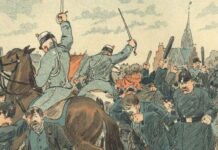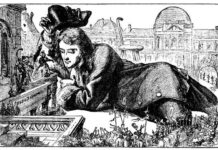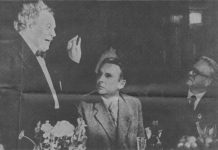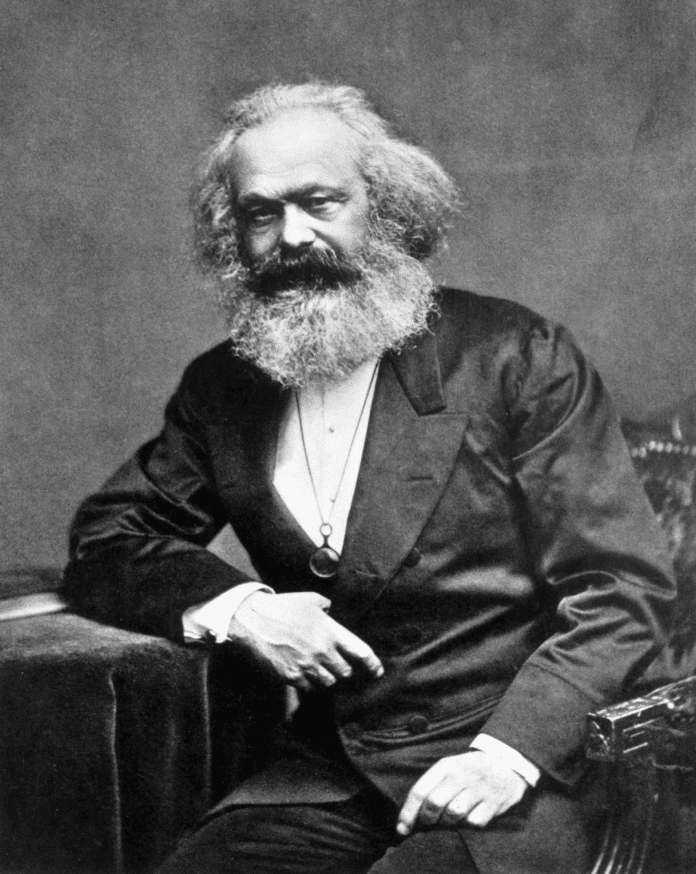
Socialistisk Biblioteks Tidslinje med links til begivenheder og personer i 1818.
Se også Index over personer, organisationer/partier og værker (som bøger, malerier, mm.), steder, begivenheder, mv., der er omtalt på hele Tidslinjen, titler og indhold på emnelisterne osv.
17. februar 1818
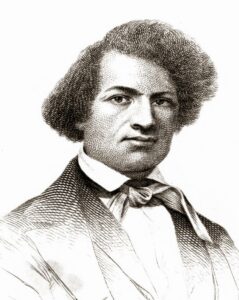
Formodede fødedag for Frederick Douglass i Talbot County, Maryland, USA (død 20. februar 1895 i Washington, D.C.). Fødtes som slave, lærte sig selv at læse og skrive, flygtede i 1838 til Nordstaterne og blev fortaler for slaveriets ophævelse, abolitionismen, og for kvinders rettigheder m.m. Udgav sine erindringen i 1845 (se nedenfor under Litteratur) og grundlagde den abolitionistiske avis, The North Star.
Leksikalt:
- Frederick Douglass (Denstoredanske). Kort intro.
- Frederick Douglass (Wikipedia.no). Norsk Wiki-artikel.
- Frederick Douglass (Spartacus Educational). Kortere biografi.
- Frederick Douglass (Wikipedia.org). Længere engelsk Wiki-artikel med talrige links til værker mv.
Artikler:
Frederick Douglass railed against economic inequality (Jacobin, 20 February 2020). “One hundred twenty-five years ago, the great abolitionist and former slave Frederick Douglass died. Today, Jacobin publishes never-before-transcribed articles from Frederick Douglass’ Paper denouncing capitalism and economic inequality.”
Frederick Douglass, John Brown, and the virtues of impracticality. By Noel Ignatiev (The Brooklyn Rail, December/January 2019-20). “Douglass made his first public appearance on an antislavery platform in 1841. For the next eight years he identified as a Garrisonian Abolitionist.”
The bicentenary of Frederick Douglass: A leading figure of the anti-slavery struggle. By Fred Mazelis (World Socialist Web Site, 20 December 2018). “This year marked the bicentenary of Frederick Douglass (1818-1895), one of the greatest figures of 19th century America, whose oratory, writings and agitation helped mightily to inspire the abolition of slavery in the Civil War, the Second American Revolution.”
The double battle: Frederick Douglass’s moral crusade. By Eric Foner (The Nation, October 25, 2018). Review of David Blight, Frederick Douglass: Prophet of Freedom (Simon & Schuster, 2018, 912 p.). “Overall, the result is a consistently engrossing book that is likely to remain the definitive account of Douglass’s life for many years to come.”
The Douglass option. By Seth Ackerman (Jacobin, September 10, 2015). “Frederick Douglass believed there was an alternative. So should we.”
“This Revolution has begun, and is in progress” – Frederick Douglass on the weakness of masters and anticipating revolutionary time (Verso/Blog, 18 June 2015). Excerpt from David Roediger, Seizing Freedom: Slave Emancipation and Liberty for All (Verso, 2014)
A mighty voice for freedom (SocialistWorker.org, February 20, 2013). “Zach Zill tells the story of the great Black abolitionist Frederick Douglass.”
What to the slave is the Fourth of July? (Socialist Worker, Issue 413, July 5, 2002; online at Internet Archive). “In a speech to the Rochester Ladies’ Anti-Slavery Society on July 5, 1852, Douglass powerfully exposed the hypocrisy of asking a slave to celebrate the Fourth of July.” Full text of speech.
Se også engelsk artikel om talen på Wikipedia.org
Frederick Douglass: great Abolitionist leader (Fourth International, Vol.7. No.9, September 1946; online at Marxists Internet Archive). “We are reprinting here several speeches of Frederick Douglass, the renowned Negro anti-slavery leader.”
Litteratur:
Frederick Douglass: En amerikansk slaves beretning: samt “Tale holdt ved afsløringen af Emancipation monument rejst til ære for Abraham Lincoln i Lincoln Park, Washington, D.C. 14. april 1876”. Overs. og efterskrift ved Hans-Jørgen Birkmose (Klim, 2010, 122 sider). Efterskrift: Fra flugten til friheden (side 109-122). Erindringer fra 1845, online in English: Narrative of the life of Frederick Douglass, an American slave (pdf) (Boston, The Anti-Slavery Office, 1845, 108 p.; online at Elegant Ebooks).
Se også erindringer fra 1891: Life and Times of Frederick Douglass, Written by Himself: His Early Life as a Slave, His Escape from Bondage, and His Complete History to the Present Time … (Boston, 1892, 752 p.; online at Documenting the American South/DocSouth)
Se også:
- The North Star (anti-slavery newspaper) (Wikipedia.org)
Se også på Socialistisk Bibliotek:
- Linkboxen: John Brown – Guerilla mod slaveriet
- Linkboxen: Den Amerikansk Borgerkrig og Abraham Lincoln
- Emneboxen: Slaveri / Slavery
[ps2i id=”18180505″ /]
5. maj 1818

Karl Marx fødes i den tyske by Trier.
(Dør i London 14. marts 1883, se også denne).
Indhold:
- Leksikalt
- Sites
- Film
- Bøger / Books
Litteratur på dansk - Se også
Leksikalt:
- Marx, Karl. Af Finn Hansson (Leksikon.org)
- Karl Marx. Af Christian Groth (Denstoredanske)
- Karl Marx (Wikipedia.org)
- Karl Marx. Af Vladimir Lenin (Marxisme Online). Trykt i det encyklopædiske opslagsværk Granat 1915. In English (Marxists Internet Archive).
- Karl Marx, 1818-1883 (The History of Economic Thought Website). Longer article.
Sites:
- Karl Marx (Marxisme Online). Tekster online.
- Karl Marx – Friedrich Engels (Marxistisk Internet Arkiv, Dansk afdeling). Tekster online.
- Karl Marx (Marxistiske Klassikere). Tekster, biografier og billedgalleri.
- Marx & Engels Internet Archive (Marxists Internet Archive). With Date index, Subject index, Multi-lingual index, Collected works, Selected Works, Biographies, Image gallery, First International and Letters. See Collected Works (Vol.1-50) på History is a Weapon + Libcom.org (under construction).
- Marx-Engels-Gesaumtausgabe (MEGA) + MEGAdigital.
Se også:
- MEGA reddet af teknisk landvindinger. Af Gerd Callesen (Arbejderen, 5. januar 2016).
- Da Marx-Engels arkivet blev reddet via Danmark. Af Gerd Callesen (Arbejderen, 29. juni 2017). Udvidet udgave: Marx-Engels arkivets redning fra Nazisterne 1933 – med danske socialdemokrater som hjælpere (pdf) (Arbejderhistorie, nr.2, 2016, s.130-141).
- Forsknings Nyt: Status på Marx/Engels-udgivelser. Af Gerd Callesen (SFAH, november 2018).
- Nyt MEGA-bind om den europæiske revolution 1848. Af Gerd Callesen (Arbejderen, 31. december 2016) + Nyt bind i MEGA-serien: Karl Marx og verdenskrisen i 1857 (25. februar 2018) + Interessant og grundigt MEGA-bind om borgerkrigen i Europa (17. februar 2021).
- In praise of Mega2. By Paul Hampton (Solidarity, Issue 539, 18 March 2020).
-
Social praksis som frigørelse – Karl Marx i den danske offentlighed, 1844-45 (pdf). Af Bertel Nygaard (Slagmark, nr.64, 2012, s.93-106; online på Tidsskrift.dk).

Marx was was laid to rest in Highgate Cemetery on Saturday, March 17, 1883.
- Tema: The death of Karl Marx (Marxists Internet Archive). Articles by Engels.
- Theme: Marx Matters (Socialist Worker.org, January 2011). Articles on the Marxist tradition from SocialistWorker.org
- The London of Marx and Engels. By Gavin McCrea (The Londonist, 1 May 2015). “From the grand atrium of the British Museum to the moss-covered headstones of Highgate Cemetery …”
- Marx walk – the life of Karl Marx in London (YouTube.com/In Defence of Marxism, 13 September 2013). “Rob Sewell walks through London explaining the ideas of Karl Marx from the point of view of his life in the city.”
Film / Movie:
Marx on the Silver Screen. By Bruno Leipold (Jacobin: Reason in Revolt, 2 March 2017). “The Young Karl Marx is an entertaining and surprisingly funny portrait of the Old Man.” See also: Peter Schwarz: Raoul Peck’s The Young Karl Marx (World Socialist Web Site, 15 March 2017) Karin Busk: Manifestet løste gåden om at forandre verden: film om den unge Karl Marx (Arbejderen.dk, 9. november 2017)
En marxist, en kapitalist og en filmkritiker anmelder ‘Den unge Karl Marx’ (Information.dk, 10. november 2017)
Alfred Lang: ‘Den unge Karl Marx’ (Autonom Infoservice, 6. december 2017)
Marie Siegumfeldt: ”Der Junge Karl Marx” – Venskabet der forandrede verden (Revolution, 11. januar 2018)
Keith McKenna: Review: Young Marx (RS21, December 23, 2017)
Scott McClemee: The Young Marx (Jacobin, 6 February 2018)
Louis Proyect: Marx at the movies (CounterPunch, February 23, 2018)
A conversation with Raoul Peck (World Socialist Web Site, 1 March 2018)
Michael Heinrich: About the movie The young Karl Marx (MR Online, May 15, 2018)
Mark Winter: The Young Karl Marx (RS21, 14 June 2018)
Simon Choat: The Young Karl Marx (Marx & Philosophy Review of Books, 8 November 2018).
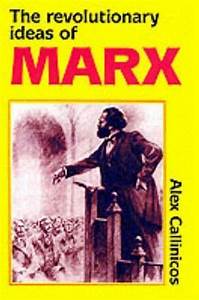
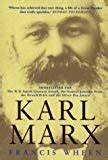
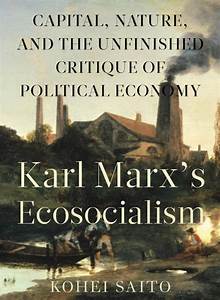
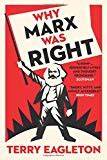
Bøger / Books:
The best books on Marx (Verso, Blog, 4 May 2018). “To mark the bicentenary of the birth of Karl Marx, a range of Marxists choose their favourite book by and about the great man. With contributions from China Miéville, Sara Farris, Mike Davis, Esther Leslie and more.
Vejen ud af kapitalismen – en diskussion af kommunismen hos Marx og Engels. Af Hans Erik Avlund Frandsen (Solidaritet.dk/Kritisk Revy, 15. juni 2022). Anmeldelse af Morten Thing: Hvad Marx og Engels mente med kommunisme? (Solidaritet, 2022, 176 s.). “Han har samlet de vigtigste formuleringer i en lille bog, så man kan følge udviklingen i deres forståelse og argumentation. Bogen er en kommenteret citatsamling, der er baseret på det nyeste kildemateriale.” Se også fra møde om M.T.s bog: Kan kommunismebegrebet bruges? (Institut for Marxistisk Analyse, 1. juni 2022).
How Karl Marx became a communist (Jacobin, December 2, 2024). Hugo de Camps Mora interviews Bruno Leipold about his book, Citizen Marx: Republicanism and the Formation of Karl Marx’s Social and Political Thought (Princeton University Press, 2024, 440 p.). “In his new biography of Karl Marx, Bruno Leipold puts his subject in historical context. Marx, he tells Jacobin, was engaged in a political struggle against utopian communists and republicans unable to recognize the incompatibility of freedom and capitalism.”
See review by Mike Macnair: Very essence of Marxism (Weekly Worker, Issue 1528, 6 March 2025).
A restless thinker. By Daniel Whittall (Review 31, November 2020). Review of Marcello Musto, The Last Years of Karl Marx: An Intellectual Biography (Stanford University Press, 2020, 194 p.). “Musto gives us a portrait of a thinker in his last years that challenges the representations others have imposed upon him.” See also review by Robert Ware (Marx & Philosophical Review of Books, 11 April 2021) + review by Kevin B. Anderson: Marx’s last years explored (New Politics, Issue 72, Winter 2022) + interview with Marcello Musto: On his birthday, let’s celebrate the old Man Karl (Jacobin, May 5, 2021).
Who the Hell is Karl Marx? … and what are his theories all about? By Judy Cox (Socialist Review, Issue 456, April 2020). Review of Manus McGrogan’s book (Bowden & Brazil, 2020, 128 p.). “Manus McGrogan successfully weaves the disparate strands of philosophy, economic, history and biography together in a narrative that is accessible without losing any depth of analysis.”
Karl Marx and the Birth of Modern Society. By Sheila McGregor (Socialist Review, Issue 451, November 2019). Review of Michael Heinrich’s book, Vol.1: 1818-1841 (Monthly Review Press, 2019, 390 p.). “Unlike others, Heinrich checks facts meticulously and embeds Marx and his writings in the economic and social circumstances, personal and political relationships, political ideas and polemics of Marx’s life.” See also interview with Michael Heinrich (Historical Materialism, 2018) + review of the German edition by Darren Rossen (Marxist Left Review, Issue 18, Winter 2019) + Louis Proyect: The intellectual development of Karl Marx (CounterPunch, September 13, 2019) + Michael Principe: Karl Marx in his times (Against the Current, Issue 206, May-June 2020) + Hans Ebbing: En Marx til å forstå (Gnist: marxistisk tidsskrift, nr.4, 2019).
Marx: A Very Short Introduction. By Lucia Morgans (Marx & Philosophical Review of Books, 27 August 2019. Review of Peter Singer’s book (Oxford University Press, 2018, 152 p.). “General readers or undergraduates seeking a comprehensive insight into Marx will find this book a stimulating starting point.”
The Handbook of Karl Marx: profitability, crises and financialisation (Michael Roberts Blog, August 6, 2019). “The Oxford Handbook of Karl Marx, edited by Matt Vidal, Tomas Rotta, Tony Smith and Paul Prew (Oxford University Press, 2019, 880 p.), brings together a series of chapters by prominent Marxist scholars covering all aspects Marxist theory, from historical materialism, dialectics, political economy, social reproduction and post-capitalist models.”
Flawed, manic, and one of us. By Rafael Khachaturian (Jacobin, 18 September 2018). Review of Jason Barker, Marx Returns (Zero Books, 2018, 352 p.): “A new book brings to life Marx’s formative years in London, filtered through the prism of magical realism.” See also review by Chris Rumble (Historical Materialism, Blog, 2018).
Responses to Marx’s Capital. By Bill Jefferies (Marx & Philosophical Review of Books, 24 July 2018). Review of Richard B Day and Daniel F Gaido (eds.), Responses to Marx’s Capital: From Rudolf Hilferding to Isaak Illich Rubin (Brill, 2017, 878 p.): “Responses to Marx spans an astonishing range of articles from many of the greatest Marxists to have written. Consistently brilliant throughout, the translations shine.”
Marx. By Bill Bowring (Marx and Philosophy Review of Books, 15 November 2018). Review of Terrell Carver, Marx (Polity, 2018, 222 p.). “Despite my criticisms, I thoroughly enjoyed reading this new book by Terrell Carver, and recommend it for scholars of Marx, as well as for absolute beginners.”
Marx 200 – a new book (Michael Roberts Blog, March 27, 2018). About his book, Marx 200 – a review of Marx’s economics 200 years after his birth (Lulu, 2018, 175 p.): “In this short book, I argue that Marx developed three key laws of motion of capitalism, around which a clear analysis of the nature of modern economies can be understood.” See review by Martin Empson (Socialist Review, Issue 436, June 2018).
Who was Karl Marx? (Verso, Blog, 4 May 2018). “Marx biographer Sven-Eric Liedman asks this very question in his new book. Here he reviews the various biographies that exist – books that in one way or another claim to deal with the complete Marx, his life and his works.”
Kampen om «marxismen». Av Hans Ebbing (Gnist/Rødt!: Marxistisk Tidsskrift, nr.4, 2016, s.10-23). “Et stort arbeid om et stort arbeid!” Anmeldelse af Sven-Eric Liedman, Karl Marx: En biografi (Stockholm, Albert Bonniers Förlag, 2015, 818 s.). Se også Om Sven-Eric Liedmans Karl Marx – en biograf (pdf) (Marxistarkiv.se, 9. maj 2016). English edition: A World to Win: The Life and Works of Karl Marx (Verso, 2018, 752 p.). See review by Martin Thomas (Workers’ Liberty, 17 June 2018) + review by David McLellan (Marx & Philosophical Review of Books, 26 June 2018) + Marx turns 200: A mixed gift, by Rafael Bernabe (Against the Current, Issue 196, September-October 2018) + review by Chris Nineham (Counterfire, April 2, 2020).
Marx deflated. By Alex Callinicos (International Socialism, Issue 152, Autumn 2016, p.167-172). Review of Gareth Stedman Jones, Karl Marx: Greatness and Illusion (Penguin, 2016, 768 p.). See also review by Terrell Carver (Marx & Philosophy Review of Books, 24 September 2016) + review by Christian Fuchs (ibid., 28 September 2016).
Marx still matters. By Matthijs Krul (Jacobin: A Magazine of Culture and Polemic, March 20, 2015). “A recent biography tries to prove Marx’s irrelevance. It fails miserably.” Review of Jonathan Sperber, Karl Marx: A Nineteenth Century Life (Liveright, 2014/2013, 672 p.). See also review by Brooke Horvath: The backward-looking prophet? (International Socialist Review, Issue 91, Winter 2013-14) + Barry Healy: Jonathan Sperber’s new bio seeks to bury Karl Marx, not praise him (Links: International Journal of Socialist Renewal, September 26, 2013) + review by David McLellan (Marx & Philosophy Review of Book, 30 July 2013).
Marx on Gender and the Family: A Summary. By Heather Brown (Monthly Review, Vol.66, No.2, June 2014). This article is adapted from the conclusion of her book Marx on Gender and the Family: A Critical Study (Haymarket/Brill, 2013/2012, 246 p.). The book online (pdf) at Online University of the Left.
See review by Jenny Morrison (pdf) (International Socialist Group, 13 December 2012) + review by Lindsey German (Counterfire, 12 July 2013) + review by Jessie Muldoon (International Socialist Review, Issue 93, Summer 2014) + review by Dianne Feeley (Against the Current, Issue 175, March-April 2015).
Marx’s Concept of the Alternative to Capitalism (Logos, Vol.13, No.1-2, 2014; online at Internet Archive). Jason Schulman reviews Peter Hudis’ book (Haymarket, 2013, 272 p.). See also review by Dan Swain (Marx & Philosophy Review of Books, 1 December 2014) + Mark Dickman: The innermost secret (SocialistWorker.org, May 15, 2014) + Sam Friedman: Yes, there is an alternative! (Against the Current, Issue 169, March/April 2014) + Ian Angus: The rule of value and the communist alternative (pdf) (Socialist Studies, Vol.11, No.1, 2016, p.216-226) + Paul Kellogg: The ideal immanent within the real (pdf) (Socialist Studies, Vol.11, No.1, 2016, p.227-236).
The triumphs of Karl and Jenny Marx. By Paul Le Blanc (SocialistWorker.org, March 13, 2012). Review of Mary Gabriel, Love and Capital: Karl and Jenny Marx and the Birth of a Revolution (Little, Brown and Company, 2011, 707 p.). See also review by Deborah Roberts: Family, life, and revolution (International Socialist Review, Issue 83, May 2012).
When Marx looked outside Europe. By Nagesh Rao (International Socialist Review, Issue 73, September-October 2010). Review of Kevin B. Anderson, Marx at the Margins: On Nationalism, Ethnicity, and Non-Western Societies (University of Chicago Press, 2010, 336 p.). See Contents and Review at Kevin B. Anderson’s site.
See also:
The book online (pdf) (Abahlali.org/Internet Archive).
No, Karl Marx was not Eurocentric. By Kevin B. Anderson (Jacobin, July 19, 2022).
Beyond the western world. Review by Ben Selwyn (International Socialism, Issue 138, Spring 2013).
Not just capital and class. By Kevin Anderson (Socialism and Democracy, Vol.24, No.3, November 2012, p.7-22; online at The International Marxist-Humanist/Internet Archive)
Learning from late Marx. By Kohei Saito (Monthly Review, Vol.68, No.5, October 2016). Review of the new expanded edition of the book (2016).
Marx and Engels: Democratic revolutionaries. By Paul Le Blanc (International Viewpoint, 12 September 2002). Review of August H Nimtz Jr, Marx and Engels: Their Contribution to the Democratic Breakthrough (State University of New York Press, 2000, 392 p.).
Karl Marx, 1-10. By Ernest Mandel (John Eatwell mfl. (eds): Marxian Economics, Macmillan, 1990, p.1-38; online at Marxists Internet Archive). Svensk udgave på Marxistarkiv.se (1.11.2021, 31 s.).
The Revolutionary Ideas of Marx (pdf). By Alex Callinicos (Bookmarks, 1983/2004, 213 p.; online at International Socialist Tendency/Internet Archive). See review by Phil Gasper: A guide to Marx’s theory and politics (International Socialist Review, Issue 82, March-April 2012).
Karl Marx: His Life and Works. By Otto Rühle (The Viking Press, 1929, 419 p.).
Karl Marx and Friedrich Engels: An introduction to their lives and work. By David Riazanov (International Publishers, 1927, 224 p.)
The Life and Teaching of Karl Marx (pdf). By Max Beer (Routledge, 2011/1921, xxxii + 14 p.) + A Guide to the Study of Marx: An Introductory Course for Classes and Study Circles (pdf). By Max Beer (The Labour Research Department, 1924, 30 p.).
Se også om Hal Drapers værk, Karl Marx’s Theory of Revolution. Vol. 1-4 (New York, Monthly Review Press, 1977-1990) på personlisten Hal Draper (Socialistisk Bibliotek).
Litteratur på dansk om Marx:
- Karl Marx. Af Gustav Bang (Socialistklubbens Smaaskrifter, nr.1, 1908, 16 sider; online på Marxisme.dk). Genudgivet af Frit Forum og Forlaget SOC i 1983.
- Karl Marx: ‘Hans Liv og Virke’, af Nina Bang (side 7-54); ‘”Kapitalens” økonomiske system’, af P. Zoffmann og C.V. Bramsnæs (side 57-96) (Socialdemokratiets forlag Fremad, 1918)
- Werner Blumenberg: Karl Marx (Thanning & Appel, 1963, 176 sider).
- Georg Reinhold Mac: Karl Marx – liv og værk. Bd. 1-3 (Fremad, 1965, 288 + 266 + 192 sider). “Giver megen viden med et minimum af anstrengelse”, iflg. litteraturlisten i efterfølgende værk! Øgenavnet er “Mac-værket”.
- Jørgen K. Bukdahl: Karl Marx (Gad, 1967, 97 sider). En filosofisk gennemgang.
- D. Rjazanov: Marx og Engels ikke kun for begyndere (Tiderne Skifter, 1974, 239 sider). Engelsk udgave: Karl Marx and Frederick Engels: An Introduction to Their Lives and Work (1927, 1937; online at Marxists Internet Archive).
- Franz Mehring: Karl Marx – hans livs historie. Bd. 1-2 (Rhodos, 1976, 641 sider).
Engelsk udgave: Karl Marx: The Story of His Life (1918) (Marxists Internet Archive). - Marx & Engels: Karl Marx (1818-1883) og Fredrich Engels (1829-1895). Katalog til den historiske studieudstilling over deres liv og virke (Karl Marx Haus, 1983, [77] sider). Dokumentudvalg og tekst.
- Marx i Danmark: historiske bidrag. Redigeret af Gerd Callesen, Steen Bille Larsen og Niels Ole Højstrup Jensen (Selskabet til Forskning i Arbejderbevægelsens Historie, 1983, 198 sider) (SFAH skriftserie; nr. 14).
- Francis Wheen: Karl Marx: et liv (Rosinante, 2001, 445 sider).
Anmeldelser:
The man behind the mask. By Peter Morgan (International Socialism, Issue 85, Winter 1999).
Karl Marx 1818-1883: Before all else a revolutionary. By David Yaffe (Fight Racism, Fight Imperialism, Issue 152, December 1999 – January 2000). - Hans Aage: Karl Marx: den proletariske klasses teoretiker (Djøf Forlag, 2004, 164 sider) (Økonomiens konger).
- Andreas Beck Holm: Karl Marx (Roskilde Universitetsforlag, 2005, 95 sider) (Samfundstænkere).
Anmeldelse:
Marx i tangatrusser. Af Ole Wugge Christiansen (Modkraft.dk/Kontradoxa, 14. oktober 2005). - Jørn Loftager: Karl Marx (Djøf Forlag, 2012, 137 sider) (Statskundskabens klassikere). Tillæg med udvalgte tekster af Marx (s.73-132).
- David McLellan: Karl Marx: en biografi (Informations Forlag, 2012, 608 sider).
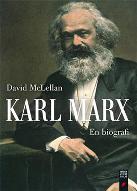
Ny Marx-biografi falder på et tørt sted. Af Andreas Stenberg (Socialistisk Information, nr.242, september 2012).
Marx reloaded. Af Ole Wugge Christiansen (Modkraft.dk/Kontradoxa, 19. juli 2012).
Karl Marx døde hverken i det 19. eller 20. århundrede. Af Steen Nepper Larsen (Information.dk, 18. maj 2012).
Anmeldelse af Preben Etwil (Historie-online.dk).
The life and thought of the ‘red terror doctor’. By Alex Miller (Green Left Weekly, Issue 744, March 19, 2008). - Kapitalen på dansk: Marx-læsninger gennem 150 år. Redigeret af Magnus Møller Ziegler, Bertel Nygaard, Jakob Bek-Thomsen og Anne Engelst Nørgaard (Slagmark, 2022, 335 sider).
Se også på Socialistisk Bibliotek:
- Linkboxen Karl Marx 200
- Tidslinjen 14. marts 1883, om Marx’s død.
- Tidslinjen 11. september 1867, om Kapitalens 1. bind.
- Tidslinjen 28. september 1864, om Første Internationale.
- Tidslinjen 10. maj 1857, om Marx og Indien.
- Tidslinjen 16. januar 1855, om Eleanor Marx, yngste datter af Karl og Jenny Marx.
- Tidslinjen 28. november 1820, om Friedrich Engels.
- Tidslinjen 12. februar 1814, om Jenny von Westphalen, gift med Karl Marx.
- Linkboxen: Det Kommunistiske Manifest.
- Linkboxen: Marx & Engels – og miljøet.
- Linkboxen: Marx and Darwin.
- Linkboxen: Karl Marx’ ‘Kapitalen’ og kriseteorier.
30. juli 1818
Engelske forfatter Emily Brontë fødes i landsbyen Thornton, ved Brandford i Workshire. (Dør samme sted 19. december 1848).
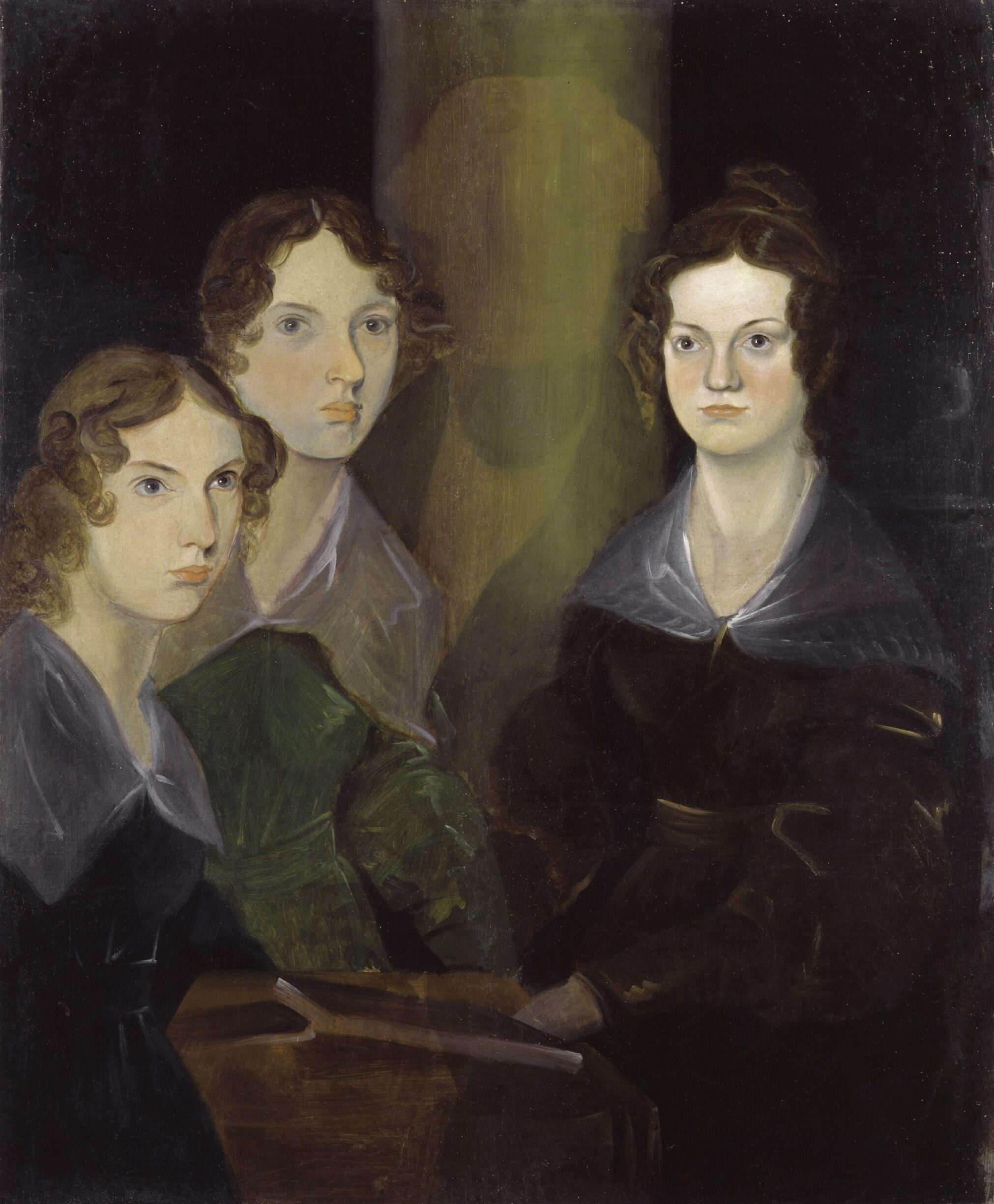
- Emily Brontë (Wikipedia.dk). Dansk artikel med link til længere engelsk.
- The Bronte Blog (site)
- Brontë-søstrene (Forfatterweb.dk)
- Overview of Emily Bronte (Brooklyn College English Department, March 9, 2011, 16 p.)
Artikler:
Emily Brontë, Heathcliff, and the nature of class society. By Jenny Farrell (Socialist Voice, 6 July 2018). “30 July 2018 is the 200th anniversary of Emily Brontë’s birth. Her singular novel, Wuthering Heights (1847), challenges class society in an amazing way.”
The Bronte sisters strove to be judged on their own terms. By Sadie Robinson (Socialist Worker, Issue No. 2534, 13 December 2013). “To Walk Invisible is a thoughtful TV drama but the turmoil and struggle of the time Charlotte, Emily and Anne wrote about doesn’t get a look in.”
















